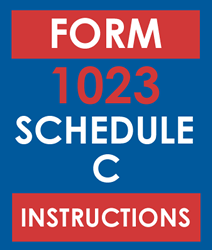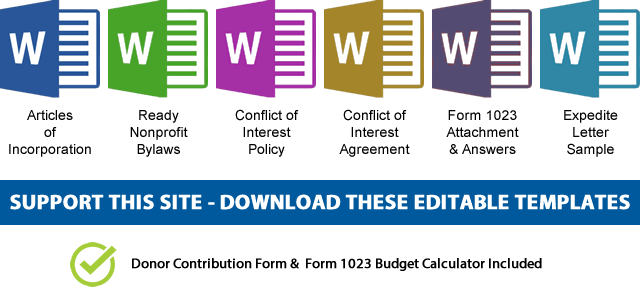Instructions on how to answer the questions on the Form 1023 Schedule C
Schedule C of the Form 1023 is for hospitals, medical research organizations and Cooperative hospital service organizations.
Before we can answer the questions on the Schedule C of the Form 1023, we need to examine the meanings of these types of nonprofit organizations.
What is considered a Hospital

An organization is a “hospital” if its principal purpose or function is providing medical or hospital care or medical education or research.
Medical care includes treatment of any physical or mental disability or condition, on an inpatient or outpatient basis. Thus, if an organization is a rehabilitation institution, outpatient clinic, or community mental health or drug treatment center, it is a hospital if its principal function is providing treatment services, as described above.
A hospital doesn’t include convalescent homes, homes for children or the aged, or institutions whose principal purposes or function is to train handicapped individuals to pursue a vocation.
What is considered a Medical research organization
An organization is a “medical research organization” if its principal purpose or function is the direct, continuous, and active conduct of medical research in conjunction with a hospital. The hospital with which the organization is affiliated must be described in section 501(c)(3), a federal hospital, or an instrumentality of a governmental unit, such as a municipal hospital.
“Medical research” means investigations, experiments, and studies to discover, develop, or verify knowledge relating to the causes, diagnosis, treatment, prevention, or control of human physical or mental diseases and impairments. For more information, see Regulations section 1.170A-9(c)(2).
What is considered a Cooperative hospital service organization
A cooperative hospital service organization performs one or more of the specific services listed below for one or more exempt hospitals on a cooperative basis. The services listed below are exclusive. A cooperative service organization that provides services other than those listed below, or that provides services to an organization other than an exempt hospital, doesn’t qualify for exemption under section 501(c)(3). The list of services includes:
- Data processing;
- Purchasing (including the purchasing of insurance on a group basis);
- Warehousing;
- Billing and collection (including the purchasing of patron accounts receivable on a recourse basis);
- Food;
- Clinical;
- Industrial engineering;
- Laboratory;
- Printing;
- Communications;
- Record center; and
- Personnel services (including selection testing, training, and education of personnel).
Form 1023 Schedule C Line 1.
Answer “Yes,” if your organization is a medical research organization, as described above.
Form 1023 Schedule C Line 1a.
As a medical research organization, you must be associated with a hospital described in section 501c3, a federal hospital, or an instrumentality of a government. Provide the name of the hospital(s) you’re associated with and describe the relationship(s).
Form 1023 Schedule C Line 1b.
List your assets and their fair market value and the portion of your assets directly devoted to medical research. Don’t complete the remainder of Schedule C.
Form 1023 Schedule C Line 2.
Answer “Yes,” if you’re a cooperative hospital service organization and describe the services you provide to your member hospitals and the exempt status of your membership. Don’t complete the remainder of Schedule C.
Form 1023 Schedule C Line 3.
Answer “Yes,” if all the doctors in your community are eligible for staff privileges at your facility. You must answer “Yes,” even if staff privileges at your facilities are limited by capacity, provided that all qualified medical professionals in your community may seek and would be considered for eligibility.
Answer “No,” if all doctors in your community aren’t eligible for staff privileges at your facility.
If you answer “No,” describe in detail how you limit eligibility for staff privileges at your facility. Include details of your eligibility criteria and selection procedures for your courtesy staff of doctors.
Form 1023 Schedule C Line 4.
Answer “Yes,” if you admit all patients in your community who can pay for themselves or through some form of third-party reimbursement (for example, private health insurance, Medicare, or Medicaid).
Answer “No,” if you limit admission for these individuals in any way and describe your admission policy in detail, including how and why you restrict patient admission.
Form 1023 Schedule C Line 5.
Answer “Yes,” if you offer emergency medical or hospital care at your facility on a 24-hour basis, seven days a week.
Form 1023 Schedule C Line 5a.
Answer “Yes,” if the reason you don’t maintain a full-time emergency room is either because you’re a specialty hospital where emergency care would be inappropriate for the services you provide or another emergency medical care facility that provides such services is located so near to you as to make such services as you might provide duplicative.
Form 1023 Schedule C Line 6.
Answer “Yes,” if you provide free or low-cost medical or hospital care services. If you answer “Yes,” describe your policy and to whom you provide these services. Include details on how these services promote benefits to the community. For example, you may want
to indicate how you determine who is eligible for the services, how you inform the general public about your policy, any requirements you require of patients to receive reduced cost or free care, and any agreements you might have with municipalities or government agencies to subsidize the cost of admitting or treating patients through this policy.
Form 1023 Schedule C Line 7.
Answer “Yes,” if you have a formal program of medical training and research. If you answer “Yes,” describe your program, including the programs you offer, the scope of such programs, and affiliation with other hospitals or medical care providers with which you carry on the medical training or research programs.
Form 1023 Schedule C Line 8.
Answer “Yes,” if you have a formal program of community educational programs and describe your programs, including the types of programs offered, the scope of the programs, and affiliation with other hospitals or medical care providers with whom you offer community educational programs.
Form 1023 Schedule C Line 9.
Answer “Yes,” if you have a board of directors that is representative of the community you serve or if an organization described under section 501c3 with a community board exercises rights or powers over you.
Answer “Yes,”if you’re subject to a state corporate practice of medicine law that requires your governing board to be composed solely of physicians licensed to practice medicine in the state.
Form 1023 Schedule C Line 9a.
List each board member by name and describe that person’s relationship to you. Also, for each board member, describe if and how that individual represents the community.
Generally, hospital employees and staff physicians aren’t individuals considered to be community representatives. If you operate under a parent organization whose board of directors isn’t comprised of a majority of individuals who are representative of the community you serve, provide the requested information for your parent organization’s board of directors as well.
Form 1023 Schedule C Line 10.
Answer “Yes,” if you operate a facility that is required by a state to be licensed, registered, or similarly recognized as a hospital. Organizations that respond “Yes,” to this question are required to meet additional requirements described in section 501(r) to be considered a hospital exempt from taxation by section 501(c).
Form 1023 Schedule C Line 10a.
A community health needs assessment (CHNA) is an assessment of the significant health needs of the community. To meet the requirements of section 501(r)(3), a CHNA must take into account input from persons who represent
the broad interests of the community served by the hospital facility, including those with special knowledge of or expertise in public health, and must be made widely available to the public. Each hospital facility must conduct a CHNA at least once every 3 years and adopt an implementation strategy to meet the community health need identified through such CHNA.
Answer “Yes,” if the hospital facility conducted a complying CHNA in the current tax year or in either of the 2 immediately preceding tax years or if the hospital facility intends to conduct a CHNA before the end of its first 3-year period.
Form 1023 Schedule C Line 10b.
A financial assistance policy (FAP), sometimes referred to as a charity care policy, is a policy describing how an organization will provide financial assistance at its hospital(s) and other facilities, if any. Financial assistance includes free or discounted health services provided to persons who meet the organization’s criteria for financial assistance and are unable to pay for all or a portion of the services. Financial assistance doesn’t include:
- Bad debt or un-collectible charges that the organization recorded as revenue but wrote off due to a patient’s failure to pay or the cost of providing such care to such patients;
- The difference between the cost of care provided under Medicaid or other means-tested government programs or under Medicare and the revenue derived therefrom;
- Self-pay or prompt pay discounts; or
- Contractual adjustments with any third-party
Answer “Yes,” if the hospital facility has adopted a written financial assistance policy and a written policy relating to emergency medical care as required by section 501(r)(4).
Form 1023 Schedule C Line 10c.
Under section 501(r)(5), the maximum amounts that can be charged to FAP-eligible individuals for emergency or other medically necessary care are the amounts generally billed to individuals who have insurance covering such care.
Answer “Yes,” if the hospital facility:
- Limits or will limit any charges to FAP-eligible individuals to whom the hospital facility provided emergency or other medically necessary services to not more than the amounts generally billed to individuals who had insurance covering such care; and
- Prohibits, or upon beginning operations will prohibit, the use of gross charges as described in section 501(r)(5).
The hospital facility may check “Yes,” if it charged more than the amounts generally billed to individuals who had insurance covering such care to an individual if:
- The charge in excess of the amounts generally billed (AGB) wasn’t made or requested as a pre-condition of providing medically necessary care to the FAP-eligible individual;
- As of the time of the charge, the FAP-eligible individual hadn’t submitted a complete FAP application and hadn’t otherwise been determined by the hospital facility to be FAP eligible for the care; and,
- If the individual subsequently submits a complete FAP application and is determined to be FAP-eligible for care, the hospital facility refunds any amount that exceeds the amount he or she is determnined to be personally responsible for paying as a FAP-eligible individual, unless such excess amount is less than $5.
Form 1023 Schedule C Line 10d.
Answer “Yes,” if the hospital facility has, or will have at the beginning of operation, either a separate written billing and collections policy, or include in a written FAP:
- A description of any actions that the hospital facility (or other authorized party) may take related to obtaining payment of a bill for medical care, including, but not limited to, any extraordinary collection actions (ECAs);
- The process and time frames the hospital facility (or other authorized party) uses in taking those actions (including, but not limited to, the reasonable efforts it will make to determine whether an individual is FAP-eligible before engaging in ECAs); and
- The office, department, committee, or other body with the final authority or responsibility for determining that the hospital facility has made reasonable efforts to determine whether an individual is FAP-eligible and may therefore
 NOTE: If you’d like to receive the following organizing documents:
NOTE: If you’d like to receive the following organizing documents:- Nonprofit Articles of Incorporation,
- Nonprofit Bylaws,
- Nonprofit Conflict of Interest Policy,
- Conflict of Interest Policy Acknowledgment,
- Form 1023 Attachment with all the answers,
- Form 1023 Expedite Letter template,
- and Donor Contribution Form
in Microsoft Word Document format, please consider making a donation and you’ll get to download them immediately. Not only they're worth well over $1000 in value, they will save you weeks of copy pasting and formatting as they are ready to go templates which only need changing names and addresses.

